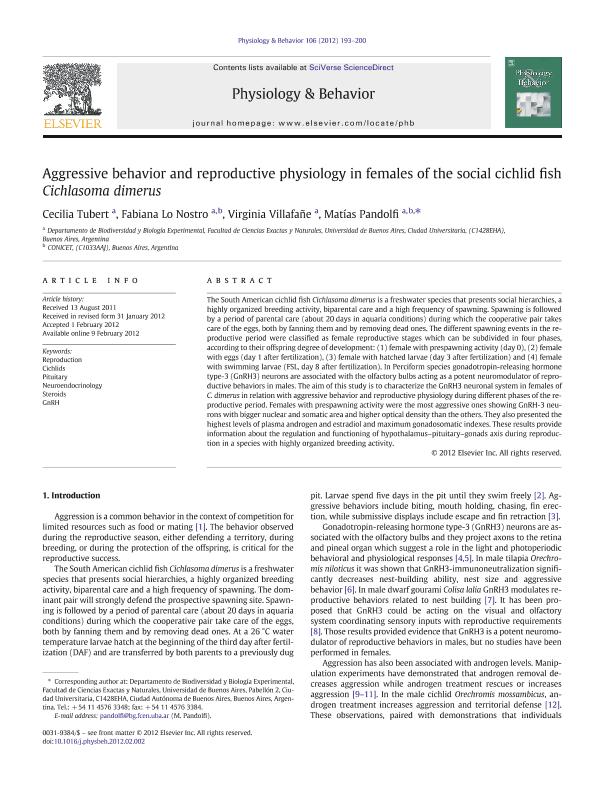Artículo
Aggressive behavior and reproductive physiology in females of the social cichlid fish Cichlasoma dimerus
Fecha de publicación:
05/2012
Editorial:
Pergamon-Elsevier Science Ltd
Revista:
Physiology And Behavior
ISSN:
0031-9384
Idioma:
Inglés
Tipo de recurso:
Artículo publicado
Clasificación temática:
Resumen
The South American cichlid fish Cichlasoma dimerus is a freshwater species that presents social hierarchies, a highly organized breeding activity, biparental care and a high frequency of spawning. Spawning is followed by a period of parental care (about 20 days in aquaria conditions) during which the cooperative pair takes care of the eggs, both by fanning them and by removing dead ones. The different spawning events in the reproductive period were classified as female reproductive stages which can be subdivided in four phases, according to their offspring degree of development: (1) female with prespawning activity (day 0), (2) female with eggs (day 1 after fertilization), (3) female with hatched larvae (day 3 after fertilization) and (4) female with swimming larvae (FSL, day 8 after fertilization). In Perciform species gonadotropin-releasing hormone type-3 (GnRH3) neurons are associated with the olfactory bulbs acting as a potent neuromodulator of reproductive behaviors in males. The aim of this study is to characterize the GnRH3 neuronal system in females of C. dimerus in relation with aggressive behavior and reproductive physiology during different phases of the reproductive period. Females with prespawning activity were the most aggressive ones showing GnRH-3 neurons with bigger nuclear and somatic area and higher optical density than the others. They also presented the highest levels of plasma androgen and estradiol and maximum gonadosomatic indexes. These results provide information about the regulation and functioning of hypothalamus–pituitary–gonads axis during reproduction in a species with highly organized breeding activity.
Palabras clave:
agresividad
,
ciclidos
,
GnRH
,
Esteroides sexuales
Archivos asociados
Licencia
Identificadores
Colecciones
Articulos(OCA CIUDAD UNIVERSITARIA)
Articulos de OFICINA DE COORDINACION ADMINISTRATIVA CIUDAD UNIVERSITARIA
Articulos de OFICINA DE COORDINACION ADMINISTRATIVA CIUDAD UNIVERSITARIA
Citación
Tubert, Cecilia; Lo Nostro, Fabiana Laura; Villafañe, Virginia; Pandolfi, Matias; Aggressive behavior and reproductive physiology in females of the social cichlid fish Cichlasoma dimerus; Pergamon-Elsevier Science Ltd; Physiology And Behavior; 106; 2; 5-2012; 193-200
Compartir
Altmétricas




